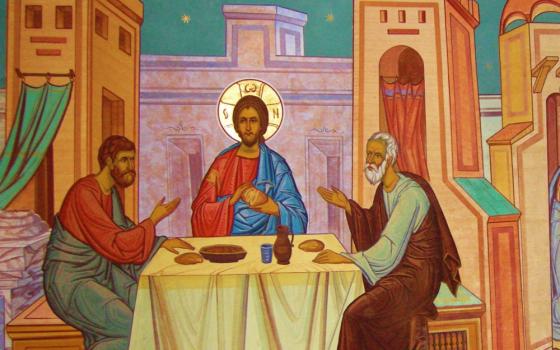The story is well-known. Two people are walking back to their town, wondering what had just happened — or perhaps more accurately, what didn't happen.
What they had been told and where they placed their hope did not transpire. Disillusioned and dismayed, they talk about their confusion for what they see as their current reality.
It seems that this same story can be seen today. So much of what we want for our world — greater connection, peace, increased stabilization, stronger global bonds, and a closing of the gap between the rich and the poor — has not transpired.
With the election of Donald Trump as president of the United States, so many have experienced disillusionment and dismay. The increasing number of protests throughout the country speaks to this. This is our Emmaus.
Our witness of the transformation of religious life (also known as "the decline") is also an Emmaus story. What we have been told that where we placed our hope is no longer bearing fruit in the way it once did.
The institutions that both religious men and women have painstakingly created and dutifully nurtured have enabled millions upon millions of people to receive quality healthcare, education and social services. In some parts of the world, those institutions seem to be no longer the areas where their energy is needed.
For many, there is a clinging to what was known, what has been done, and what the hierarchical church tells us our role should be.
Are we not in a time of disillusionment and denial? Are we walking a road where we may understand this transformation from a cognitive place, and yet we continue to journey toward the heart-place of understanding? This is our Emmaus.
The reality of what was to be — in our world and in religious life — is sometimes shattered by some other reality that creeps in and takes hold. Think about what you had hoped life would be like by the year 2020: Was it global connectedness rather than a movement toward nationalism? Eradication of something (you name it)? Religious life continuing to thrive in numbers? Living at a time that is not known as the "post-truth age"?
Think about what motivates your current view of reality. Where are the places of denial, dismay and disillusionment? What is your Emmaus?
As the Emmaus story continues, a stranger appears on the road. Strangers often invite us to see things differently. They are not so familiar with how life works in our own little world and they push the edges of our comfort zone. This stranger is then revealed as the risen Christ.
I can only imagine that they felt even greater confusion in the moment, and yet a deep knowing and experience of rightness. Their dream of Jesus returning as the equivalent of an all-powerful, worldly king is shattered. Yet, here is the Truth, breaking bread with them.
Jesus reframes the reality of what is in front of them and entered their hearts. Their impulse toward the future was transformed.
Rabbi Abraham Heschel wrote:
Faith is not the clinging to a shrine but an endless pilgrimage of the heart. Audacious longing, burning songs, daring thoughts, an impulse overwhelming the heart, usurping the mind — these are all a drive toward serving him who rings our hearts like a bell. It is as if he were waiting to enter our empty, perishing lives.
Are we allowing Jesus to reframe our reality? Rather than reflecting on "what" is happening in our current reality, I find myself reflecting on the "why" — why is this happening now, in our current time, when we are alive to witness and influence what is transpiring?
This question of "why" allows Jesus to enter the conversation and provide the reframe. It is the answer to this "why" to which men and women religious are called today. Of course, the answers are unfolding and undefined.
Collectively and individually, we need to discern the "why" and invite Jesus into the dialogue to be transformative agents in our congregations, communities, country and the broader world.
The Emmaus story calls us to pay attention to our "audacious longing, burning songs, daring thoughts, an impulse overwhelming the heart, usurping the mind." The fear and dismay that is experienced on such a journey is to be brought to light and transformed.
The stranger is invited to push against our comfort zone. Take some time to reflect on the "why" and invite Jesus into the conversation.
Where have you placed your hope that may belong to a shattered reality? What are you being invited to notice? What is your impulse toward the future? And, most importantly, are you willing to risk entering into this new reality?
[Linda Buck is a Sister of St. Joseph of Orange whose ministry focuses on the integration of psychology and spirituality, providing services, consultation and training in both of these areas. She is passionate about issues surrounding systemic injustice as well as mental health advocacy.]

